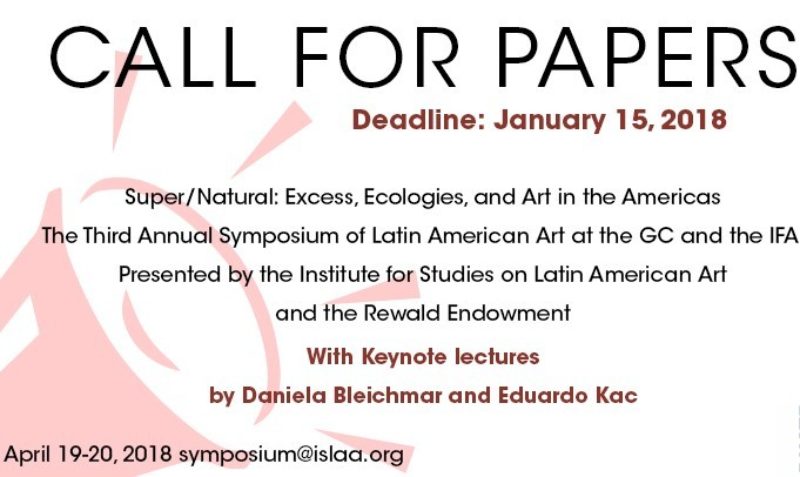About this Call for Papers
We are currently seeking papers for The Third Annual Symposium of Latin American Art, "Super/Natural: Excess, Ecologies, and Art in the Americas” which will be held April 19-20, 2018 at the Graduate Center, CUNY and the The Institute of Fine Arts: Presented by the Institute for Studies on Latin American Art and the Rewald Endowment.
Deadline: Monday, January 15, 2018.
On September 19, 2017, an earthquake struck central Mexico, devastating many cities. Responding to the disaster, a government employee stated, “It’s like Sodom and Gomorrah, like God is angry at us.” Just one day later, Hurricane Maria hit Puerto Rico, destroying natural landscapes and human infrastructure throughout the island. Carmen Yulín Cruz, the Mayor of San Juan, said, “I’ve never seen devastation like this. The human spirit is going to have to rise up real high.” These comments highlight the power of nature to overwhelm human comprehension. Rooted in a positivist paradigm, modern Western thinking pits “man” and “nature” in a competitive duality, each posturing for subordination and control. However, there are many other ways to imagine such relations. For example, the Brazilian anthropologist Eduardo Viveiros de Castro has posited “Multinaturalist Perspectivism” based on Amerindian cosmologies that do not purify nature, but assume the coexistence of multiple, shared natures including the human, animal, and spiritual. These, and other views on the natural world, compel us to question how we understand our relationship to the physical environment around us.
The recent natural disasters, environmental destruction, and mounting scientific evidence for the immediate dangers of climate change throughout the Americas have inspired this year’s symposium theme: Super/Natural. The supernatural is what exceeds nature and what is excessive in nature through the insertion of human or mystic interventions. Super/Natural, however, is not just the otherworldly, but the critical interstices between the human abstraction of nature, the tangible natural world, and that which exists around it. As such, we solicit papers that deal with intersections of human, natural, and supernatural forces in the arts or visual culture.
The complex relationship between humanity and its surrounding environment has been amply explored by artists and peoples in the Americas. Examples include pre-Columbian art and architecture embedded in the landscape, such as the Incan fortress of Sacsayhuaman near Cusco, eighteenth and nineteenth-century traveler artist’s tropical fantasies of the land, and contemporary projects in which the human body intervenes directly in the environment. All of these practices demonstrate artists’ and communities’ preoccupation with contesting the often incomprehensible structure of the natural world. By presenting multidisciplinary case studies from a diverse group of scholars, this symposium seeks to open a conversation about the role of cultural production in understanding and complicating our relationship with the environment. The proceedings will historically situate these narratives while keeping in mind current debates on climate change and sustainability throughout the Americas. In what ways do artists engage with and intervene in nature and the land to create extraordinary perspectives? Under what conditions do spiritual practices related to nature and land become visualized in art? When, if ever, are we forced to intervene in the natural world, and what are the risks of such endeavors?
Possible topics may include analyses of art and visual culture that deal with:
- Biocentrism, ecocriticism, the anthropocene, or other theories that complicate the relationship between nature and humanity
- Developmentalism, the use of natural resources and agricultural productivity, and so-called “economic miracles”
- Practices that embrace or challenge alignments of the “feminine” with nature
- Interventions in the natural world including but not limited to environmental destruction, land displacement, and exploitation
- Terretorialization/deterretorialization: exile, migrations, diasporas, displacements, and expansions
- Naturalized and denaturalized identities; dissident approaches to what is “natural” or “anti-natural” (including race, gender, sexual orientation, etc.)
- Symbolic and ritualistic practices that (re)claim territories, whether visionary, spiritual, or syncretic
- Representations of Latin American territories by explorers, artists, and/or exhibitions
- Enhancement of natural designs through art, science, and technology
- Tensions between local affiliations and national borders, such as pre-Columbian conceptions of the territory and the possibilities of a pan-American region
- Built environments—permanent or ephemeral—that emphasize a reliance on nature
Current graduate students, recent graduates, and emerging scholars are invited to apply, especially those based in Latin America and the Caribbean. Topics from all historical periods of Latin American / Latinx / Chicanx / and Caribbean art (e.g. pre-Columbian, Colonial, Modern, Contemporary), as well as fields outside the realm of art history, but grounded in visual material (e.g. Cinema and Media Studies, Latin American and Latinx studies, Visual Culture) are highly encouraged. Abstracts will be accepted in English, Spanish, and Portuguese.
How to Apply: To apply, please submit an abstract of up to 300 words to [email protected] by Monday, January 15, 2018.
Applicants will be notified of their acceptance by Monday, February 5, 2018. Presentations will be limited to 20 minutes, with additional time for discussion. In your application, please indicate your current institutional affiliation and from where you will be traveling, as well as the languages you speak. Limited funding may be available to assist with travel expenses.
For further information or with any questions, please contact [email protected].
